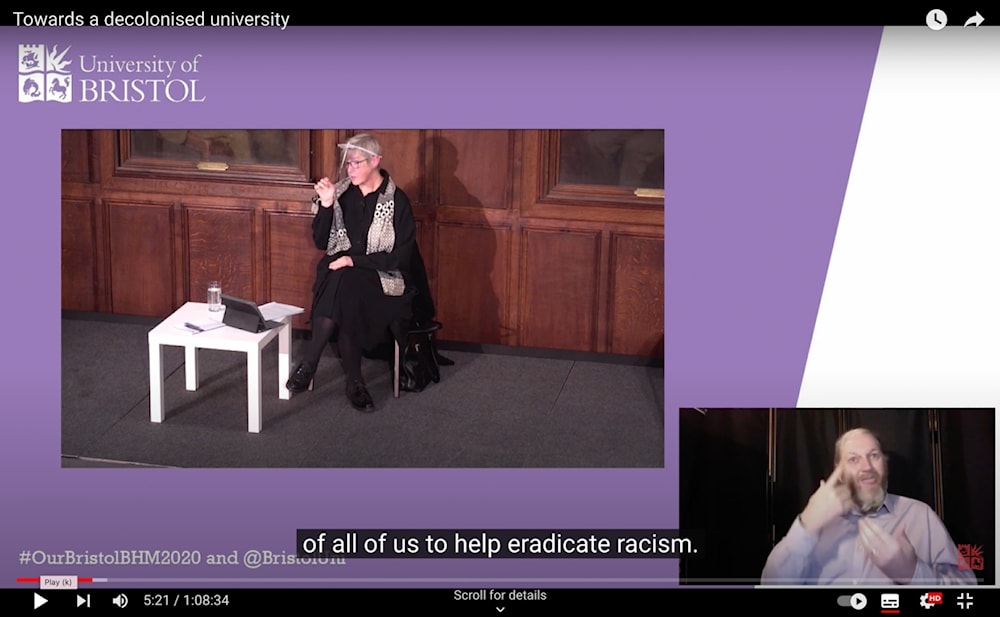Why 'Anglo-Saxonism' is - like Zionism - racism: How Professor Judith Squires destroyed Bristol University in court
How Bristol University pursued a disastrous legal strategy and destroyed their own legal case. Meet Professor Judith Squires who destroyed the university case in the witness box and decisively threw it away.
-

How Professor Judith Squires destroyed Bristol University in court (Illustrated by Batoul Chamas; Al Mayadeen English)
In February, I won an employment tribunal against Bristol University. The university had sacked me from my post as Professor of Political Sociology in October 2021 after a thirty-month campaign by the Zionist movement to have me removed.
Amongst the relief and jubilation of the verdict issued by the tribunal, there was a sense of wonder. I knew that Bristol had not properly investigated the complaints against me or properly weighed what to do as a result, and this view was handsomely confirmed in admission after admission by the two Bristol officials who had investigated and fired me and who gave evidence at the tribunal in October. It was Bristol’s own witnesses who holed their case beneath the waterline.
But even more dramatic damage was done to the Bristol case by the overall legal strategy adopted by Bristol and by the incredible evidence of the most senior witness to give evidence on behalf of the university. It was she who decisively sunk Bristol beneath the waves. Let me explain.
Bristol University investigated me three times. Each investigation found no evidence of antisemitism in anything I had said or written. The latter two investigations were carried out by an external QC. The University, has, to this day, refused to say in public that I was found, on each and every occasion, not to have said or written anything antisemitic. This belligerent and dishonest approach carried over into their legal strategy in court. As soon as the case commenced, lawyers for Bristol indicated they wished to change their case. They had previously accepted that my views were worthy of respect, but the new cases hurriedly put together in an email on the first morning of the tribunal was that my anti-Zionist beliefs as declared in my witness statement lapsed “into unevidenced conspiracy." Furthermore, they stated that my belief that Zionism was racist and that it therefore should be opposed was “not worthy of respect in a democratic society.” This is the legal language used in the Equality Act 2010, which defines “protected” philosophical beliefs.
This was a belligerent and reckless strategy because it claimed that my anti-racist ideas were “akin to Nazism,” which is the legal test for ideas not worthy of respect. This was always going to be a misguided approach, but in practice, it was turned into a weapon by my legal team enabling them to force the most senior witness into apparently contradictory testimony. Professor Judith Squires was and still is the second most senior officer at Bristol University. She is a political theorist by specialism having written a number of books on gender equality and also having written on the French theorist of power relations Michel Foucault. She is more sympathetic to him than I am. It should also be noted that Squires has taken something of a lead at the University in positioning the university as an anti-racist institution. The image below is a screengrab from a lecture posted by the university on its Youtube channel titled “Towards a Decolonised University” in October 2020 when I was still enduring the first of the two QC investigations I faced. In the talk that Squires gives, she repeats what she has said in writing elsewhere, which is that “it’s the responsibility of all of us to help eradicate racism."
Given her evident involvement in such issues, it might seem surprising that my barrister, Zac Sammour, found it difficult to pin down Professor Squires. On many occasions during cross-examination, she appeared to evade questions rather than answer them. So at the beginning, we had this:
Q: Do you believe those things that have been put forward on the university's behalf?
A: This is an accurate account of the university's claim, yes.
Q: Do you believe them is what I asked.
Later Zac Sammour was able to get Professor Squires to confirm that she did believe in the University case:
Q: Do you believe that that belief is incoherent because it lapses into an unevidenced conspiracy?
A: Yes. I am endorsing the claim that we put, yes.
Q: Do you think this is an unevidenced conspiracy, that belief? Yes?
A: I am saying it's not coherent.
Q: And you think that belief is akin to Nazism. It is not worthy of respect in a democratic society.
A: As articulated, I do think it's not worthy of respect in a democratic society, yes.
But then Professor Squires gave a strong hint that she didn’t really believe the university case when she said that they only came up with the idea in response to the claim made by me that my views should be protected.
Q: Well when did it dawn upon you that the view that Zionism is racism and imperialist and colonial was so abhorrent that it actually should not have any protection at all? When did you come to that realization?
A: So I think what we're doing is a response to a claim that it's a protected belief.
Q: So are you saying you only came to that realization when it was in your interests in litigation to believe it? i.e. when you are defending your claim.
A: When a specific issue is put to us, or to me, then you respond to it. It doesn't mean that you have put it on the agenda yourself.
Zac Sammour pressed her further to state when and why she had changed her mind about my views.
Q: You agreed with me earlier that one knows a belief that is so abhorrent it is akin to Nazism when one sees it. It is not something that requires years of analysis. So either it is the case that you have adopted a belief that you never really believed in because it is advantageous for you in the litigation, i.e. you are now saying something you do not really mean because it helps you in the litigation, or you have always believed it. It is as simple as that, is it not, Professor Squires?
A: There's nothing in that statement I just read that mentioned anything about being akin to Nazism. It talked about cogency and coherence.
Q: Well it talks about not being worthy of respect in a democratic society... Were you not aware?
A: To be honest, I can't actually recall, amongst all of the papers, about what I read beforehand, I'm afraid.
Q: But you were unaware that the, "It's not worthy of respect in a democratic society," the test, the sort of touchstone that the courts have used for that is it is akin to Nazism. Is that something that is new to you or news to you?
A: I think it would have been the first time I'd heard it in the preparation for this case, yes.
So, in the end, it looked like Professor Squires had either not been properly briefed by her legal team or had forgotten or misunderstood the case that she was required to make.
The impression was left that no one in the university truly believed in the university's case. This was buttressed when Zac Sammour took Professor Squires through a series of questions about a putative ideology of "Anglo-Saxonism".
Q: If Britain adopted an ideology, an ideology which says Britain is the homeland of the Anglo-Saxon people. That is the ideology. Anglo-Saxonism, we can call it. It removes, forcibly removes 75 percent of all non-Anglo-Saxon inhabitants of Britain and pushes them into Cornwall. The 25 percent that remain are discriminated against. And it adopts a law that says all of the non-Anglo-Saxons that have been removed may never return. Any Anglo-Saxon in the world may return… Would that be racist and would the ideology underpinning it be racist?
A: I believe it would, yes.
Q: Now if it is right as a matter of fact that Zionism does call for the establishment of a "state" for Jews and only Jews in a land inhabited by Jews and non-Jews, and the creation of the "state" was achieved through the forcible transfer of 75 percent of the non-Jews, and if "Israel" adopted laws which said the Arabs that have been removed may never return. Any Jew anywhere in the world may… What would be incoherent in the claim that… the ideology that underpinned all that activity, is racist?
A: No, I don't think that -- sorry, I don't think there is an incoherence.
Q: And what in that analysis, so the claim that that is racist or colonial or imperialistic, what about that is so bad, so abhorrent that people saying it should have no protection in law?
A: I don't think there's anything hugely abhorrent in those statements that you just made…
Q: [What about] for saying, "Zionism is racist because I can't go back and live in the house my grandad built, but a Jew can. Any Jew, anywhere in the world. That is racist. That should be opposed." Do you think that that is not worthy of protection?
A: … I don't think it's not worthy of protection...
Q: So it is worthy of protection, is it not.
A: Yes.
And there we had it. Professor Squires thought both that my views were akin to Nazism and that they were not. They were therefore worthy of protection under the law.
During the process, there had been much to-and-fro about what was being asked and the university email recasting its case had to be brought over to Professor Squires on a laptop. Then after she made her contradictory statement, the court adjourned so that the email could be printed out. Given 15 minutes to think about it, Prof Squires came back into court and the following from Mr Sammour:
Q: If she does not believe it, the respondent's case has to be withdrawn. The respondent cannot advance a case that nobody in the university believes.
Faced with the enormity of sacrificing the whole case for want of anyone to endorse it, Professor Squires reverted to her former position, finally conceding, sotto voce:
Yes. I am saying it is not worthy of respect in a democratic society.
The whole performance was breathtaking and the transcripts cited here don’t give a full sense of the theatricality of the moment. There were times when after being asked a question, Professor Squires gazed at the ceiling for what seemed like an eternity. I was sitting some six feet away, to her left throughout. I was not sure if she had not heard the question or was refusing or unable to answer. As perhaps can be seen from the brief extracts reprinted here, it's most likely that she simply did not know how to answer. If the university legal team (external lawyers and counsel and the University’s in-house lawyer Jane Bridgwater - who was present throughout) were working for me and I had been left so badly briefed that I walked straight into an ambush as a result of apparently being inadequately prepared, I might have been a little displeased with their collective performance. But maybe that’s just me? One of the issues that this raises is the extent to which an argument could be advanced that the most senior staff at a university can bring the institution into disrepute.
In the end, Professor Squires' debacle of an appearance was not the only thing that lost them the case. The earlier witnesses had already effectively done that. But it was an indication of the difficult position that senior university administrators – even those with a specialism in political theory and equality issues – can find themselves in when they allow their institutions to be bullied, hectored, and intimidated by the juggernaut that is the Zionist movement.

 David Miller
David Miller
 11 Min Read
11 Min Read













